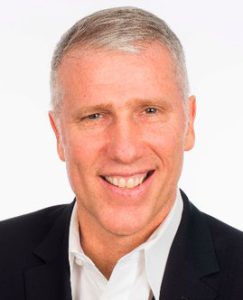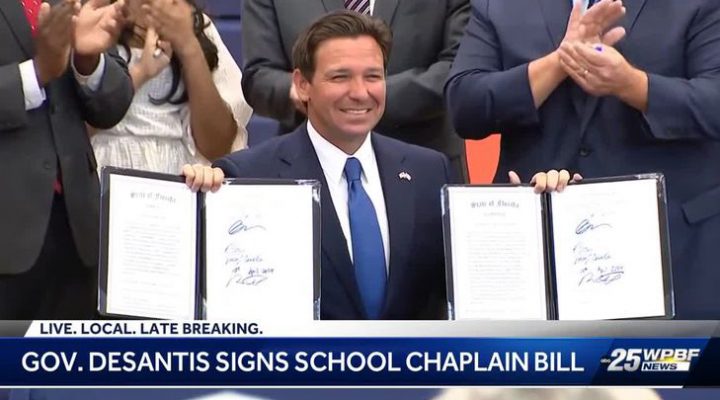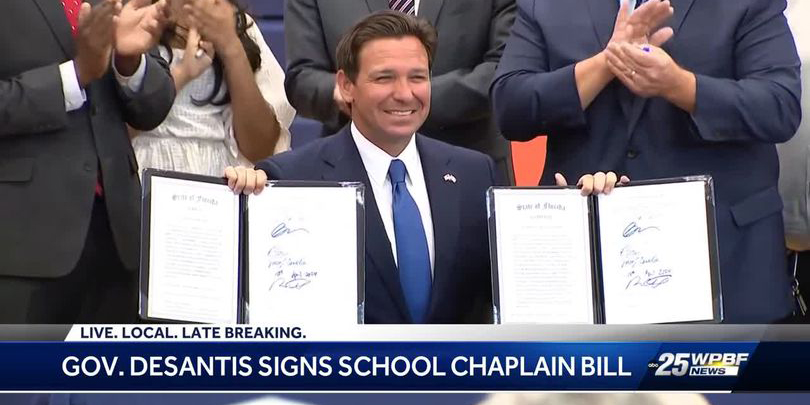Florida Gov. Ron DeSantis and his supporters celebrated his recent signing of a new law allowing untrained and unlicensed chaplains to volunteer in public schools.
“At a time when much of the country is facing a mental health crisis, having volunteer chaplains for K-12 schools is a common-sense solution. We are selling our kids short if we only focus on meeting their intellectual needs but fail to make provision for their spiritual and emotional needs,” said state Rep. Stan McClain, the Republican who sponsored the school chaplaincy legislation DeSantis signed April 18.
But religious and civil rights groups warned the program poses threats to religious liberty and to the spiritual and mental well-being of students and their families.

Paul Raushenbush
“As a minister, I know that chaplains can play an appropriate and important role in the lives of many families, but their place is absolutely not in our public schools,” Interfaith Alliance President Paul Raushenbush said. “The legislation Gov. DeSantis just signed opens students up to potential religious coercion and creates a serious risk that those in need of support from trained counselors will not receive it.”
The American Civil Liberties Union of Florida denounced the program, which takes effect July 1, as a menace to the Constitutional rights of public school students.
“Allowing public schools to establish paid or voluntary positions for chaplains will inevitably lead to evangelizing and religious coercion of students.”
“Allowing public schools to establish paid or voluntary positions for chaplains will inevitably lead to evangelizing and religious coercion of students. This violates the First Amendment’s Establishment Clause, which, along with the Free Exercise Clause of the First Amendment, safeguards the constitutional right to religious liberty,” the ACLU statement added. “Courts have repeatedly ruled that it is unconstitutional for public schools to invite religious leaders to engage in religious activities with students or to promote religious doctrine to them.”
Allowing the volunteers to serve without the training and certifications required of professional school counselors signals the legislation’s true purpose, the ACLU said. “Exempting chaplains from the same professional requirements as other school staff makes clear that installing them in public schools is not about helping students but is yet another effort to subject children to unconstitutional government sponsored religious indoctrination.”
With the enactment of House Bill 931, Florida becomes the second state to codify a school chaplaincy program, with Texas leading the way in September 2023. Similar legislation has been introduced in Alabama, Georgia, Indiana, Iowa, Kansas, Louisiana, Maryland, Mississippi, Missouri, Nebraska, Ohio, Oklahoma and Utah.
The simultaneous effort to bring volunteer chaplains into the nation’s public schools appears to be inspired by the National School Chaplain Association, an Oklahoma-based organization dedicated to evangelizing school children in every state in the nation.
“The association believes spiritual care has long been absent from the school system. As a result, students are often left alone to navigate complex emotions without support from trusted adults or authority figures,” its website says.
So far, the school chaplaincy idea has not been well received and has not been successful.
In Texas, professional chaplains and other faith leaders circulated letters and petitions urging legislators to vote against the measure in order to protect students from proselytizing and from receiving unqualified emotional and educational advice.
When the bill became law, Baptist Joint Committee for Religious Liberty spearheaded a grassroots campaign to dissuade school boards in Texas from enrolling in the program by the March 1 deadline. BJC and allies like Texas Impact and the Religious Action Center of Reform Judaism ultimately helped convince numerous districts, including the 25 largest, to reject the program.
Similar campaigns are being waged by a coalition of professional chaplains and religious leaders in a dozen other states. Last month, 34 civil rights groups, 38 faith-based organizations and 265 professional chaplains sent letters protesting school chaplain bills in a dozen states.
“Families and religious institutions — not public-school officials — should direct the religious education of our children. Introducing religious leaders into official school positions to serve students in schools will cause division among student bodies that are made up of many religions and nonreligious students,” the chaplains said in their letter to legislators.
Seeking to deflect criticism, DeSantis and his supporters have emphasized that use of chaplaincy program is up to each district and charter school board and that written consent from a parent or guardian will be required for a student to receive counseling from a school chaplain.

Guthrie Graves-Fitzsimmons
“Faith leaders and civic organizations are important additional resources for students who may be facing challenges or need to build community and camaraderie,” DeSantis said. “I’m pleased to be able to expand the variety of options that students have at their disposal in school, and we have no doubt that these options will enhance the experiences of our students.”
The same day he approved the chaplaincy law, DeSantis signed House Bill 1317, which enables school districts to allow civic and patriotic organizations to visit schools. These include Big Brothers Big Sisters of America, Boy Scouts and Girl Scouts, Future Farmers of America and the Marine Corps League.
Religious liberty advocates urged Florida school districts to avoid the church-state entanglement created by the chaplaincy program, however.
“Florida’s school chaplain law ignores the religious freedom concerns raised by faith-based groups, civil rights groups and trained chaplains,” said Guthrie Graves-Fitzsimmons, communications director for BJC. “Any state considering school chaplain programs should listen to the more than 265 chaplains warning the nation that ‘we strongly caution against the government assertion of authority for the spiritual development and formation of our public school children. Families and religious institutions — not public-school officials — should direct the religious education of our children.'”
Districts in the state can expect to see a coordinated effort to reject the chaplaincy program, Raushenbush added. “A broad coalition of people of diverse faiths and beliefs is standing together to challenge dangerous legislation like this in Florida and across the country.”
Related articles:
All 25 largest school districts in Texas reject school chaplains option
100 chaplains urge Texas schools not to take the bait on school ‘chaplains’
Four groups warn Texas schools against new chaplaincy scheme


